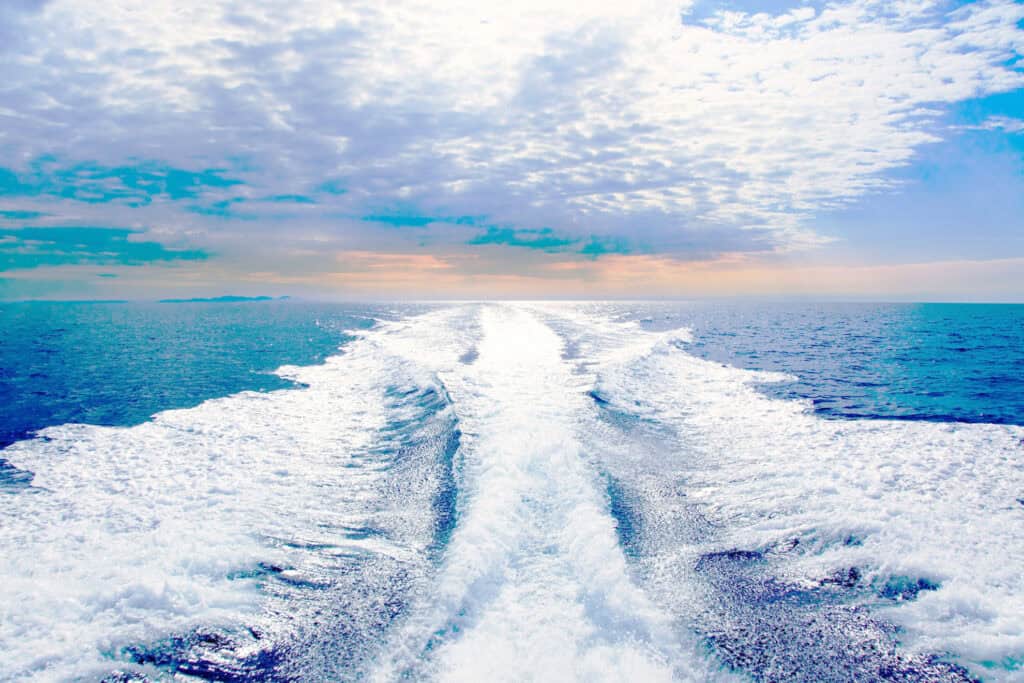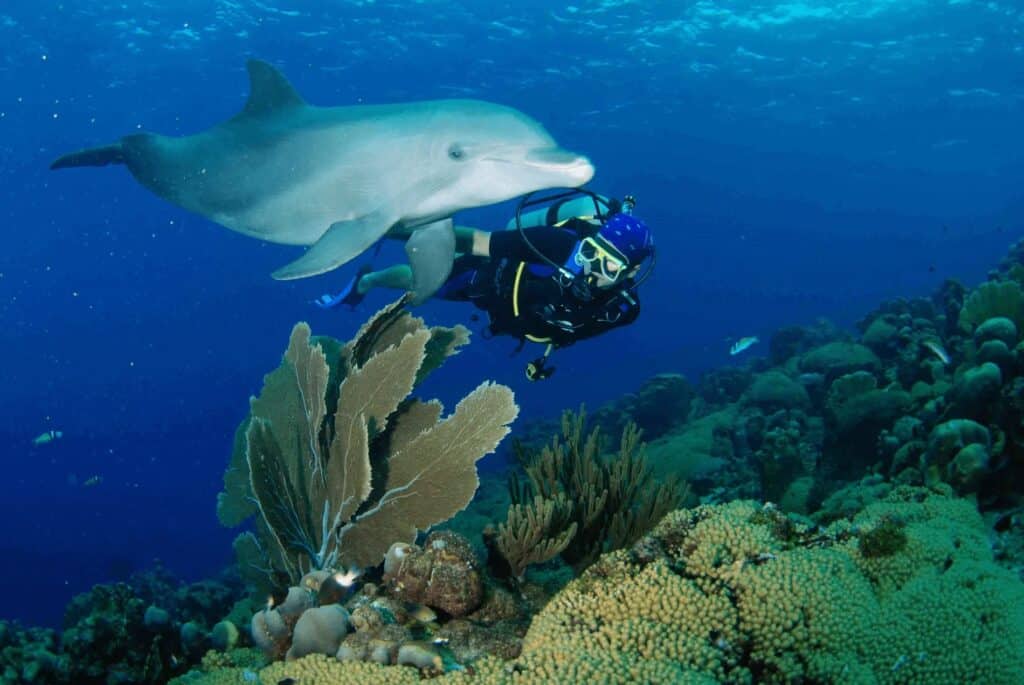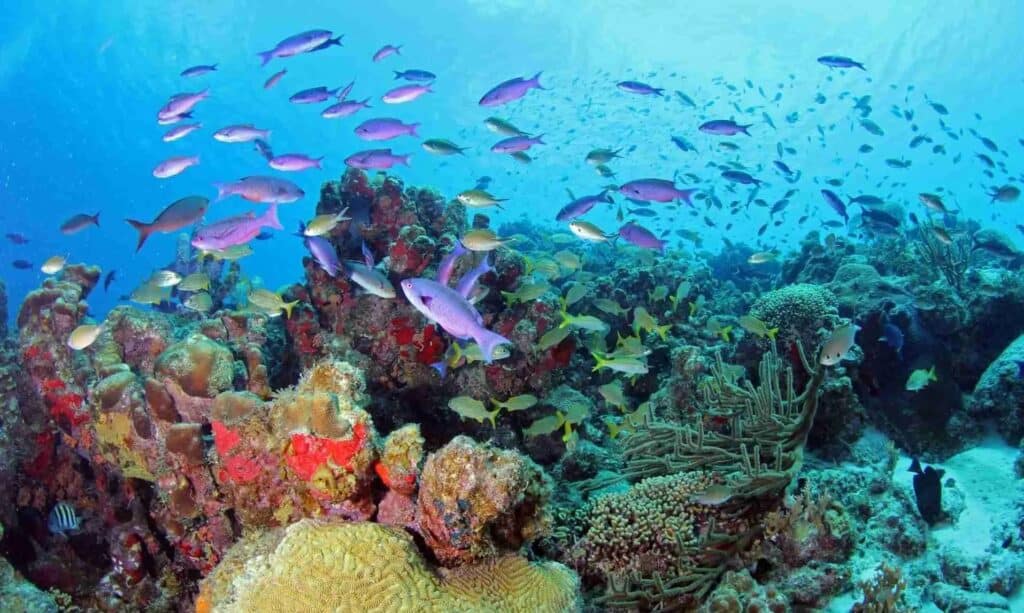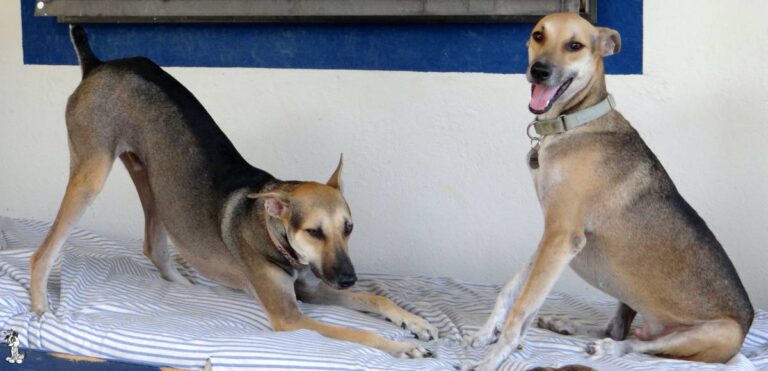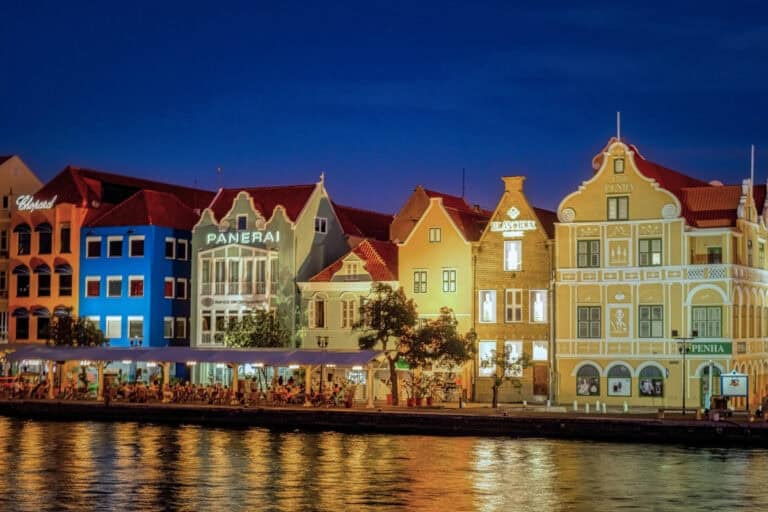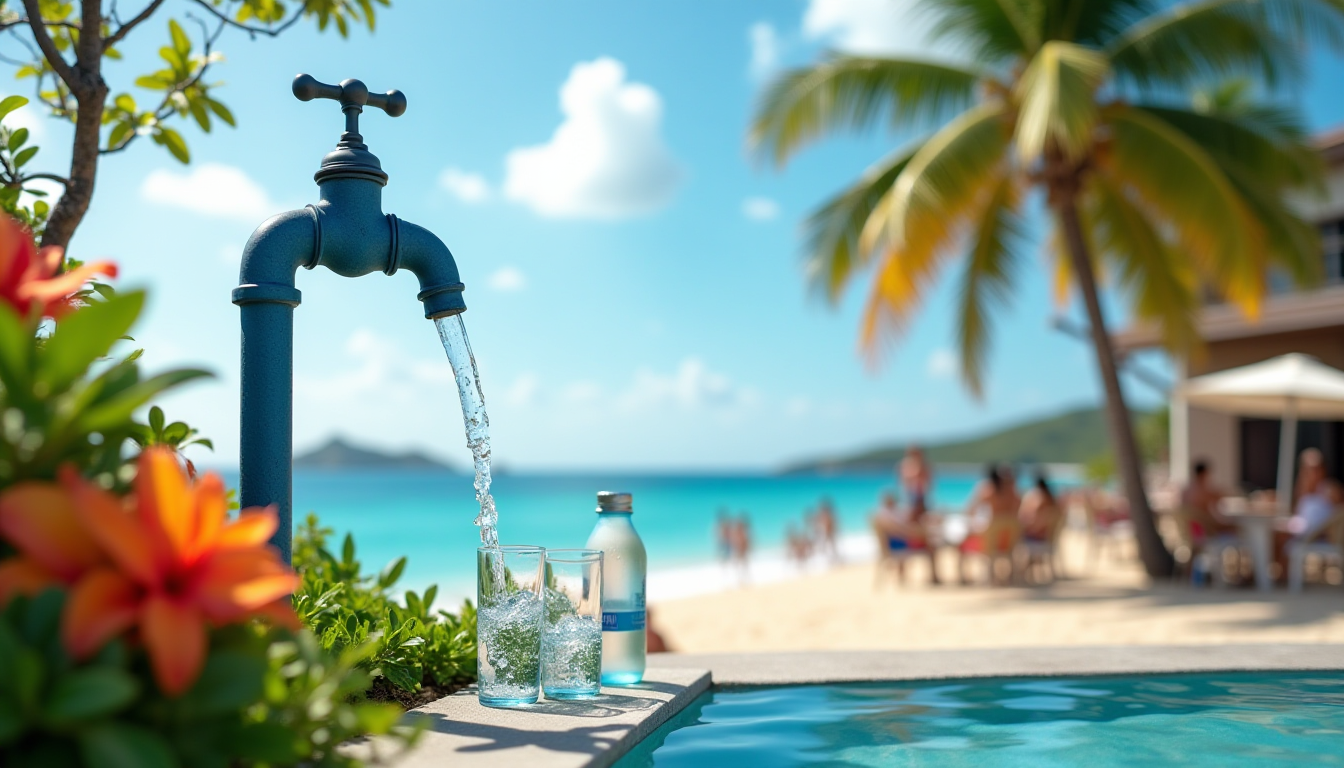
Is tap water ok in Curaçao?
Is tap water ok in Curaçao?
Planning your Caribbean getaway and wondering whether you can safely drink from the faucet during your stay?
What you need to know about drinking water on the island
Yes, tap water in Curaçao is completely safe to drink and meets international standards set by the World Health Organization. The island operates one of the Caribbean’s most advanced seawater distillery facilities, producing high-quality potable water through a sophisticated desalination plant. This purification process transforms seawater into clean drinking water that undergoes rigorous testing for both chemical content and bacteriological composition, ensuring excellent water quality throughout the public water system.
You can confidently drink tap water directly from public water supplies, use it for brushing teeth, and enjoy ice cubes at restaurants without concern. The desalinated sea water may taste slightly different from what you’re accustomed to at home due to its mineral content, but it’s perfectly safe and refreshing under the tropical sun. Many hotels like LionsDive Beach Resort and environmentally-conscious establishments participate in programs encouraging visitors to use reusable bottles rather than purchasing bottled water, helping reduce plastic waste on this sustainable island.
Consider bringing a refillable bottle to take advantage of public taps and filtered water stations throughout Willemstad and tourist areas, supporting Curaçao’s commitment to waste reduction while staying hydrated during your adventures exploring pristine beaches and national parks.
Luxury car rentals in Curaçao
Experience transparent pricing and exceptional service with Rent Car Curaçao. Choose from luxury vehicles elevate your Curaçao adventure.
Understanding the water purification system and sustainable practices
Curaçao’s commitment to providing clean drinking water extends beyond simple water safety standards. The island’s infrastructure represents decades of investment in advanced treatment technology and environmental stewardship, making it a leader among Caribbean islands in both water production and sustainability initiatives.
How the desalination process works
The island’s primary water production facility uses reverse osmosis technology to convert seawater from the Caribbean Sea into potable water. This seawater purification method forces salt water through specialized membranes that remove salt, minerals, and impurities at the molecular level. The resulting distilled seawater undergoes remineralization to add back beneficial calcium ions and minerals, giving the water its characteristic mineral flavor while ensuring it meets drinking water standards. Modern water testing laboratories continuously monitor the output, checking samples multiple times daily to guarantee consistent quality from the water purification system.
Refill stations and reducing plastic waste
Curaçao actively promotes waste reduction through its Water Refill Program Curacao, which encourages visitors and residents to use refillable bottles instead of purchasing single-use PET bottles. You’ll find filtered water stations at many hotels including Avila Beach Hotel, shopping areas throughout Willemstad, and near popular attractions like ancient caves and butterfly-filled gardens. The initiative, supported by organizations like Join the Pipe, offers BPA-free bottles and promotes the use of the reusable D-TAP bottle at participating locations. This approach significantly reduces the environmental impact of tourism while supporting the island’s Sustainable Development Goals and vision of becoming a more sustainable island.
Where to safely refill throughout the island
Finding clean water during your island adventures is straightforward thanks to widespread access to public taps and dedicated water taps at tourist-friendly locations. Major beaches, national parks, and cultural sites provide reliable access points. Many pet-friendly hotels and establishments like Green Phenix proudly display refill station signage, welcoming travelers to fill up before heading out to explore candy-colored buildings in Willemstad or pristine beaches around the coastline. The tourist board provides maps showing refill locations, making it convenient to stay hydrated without purchasing bottled water.
Comparing tap water to bottled options
While both filtered water from taps and bottled varieties meet safety requirements, choosing tap water offers practical and environmental advantages. The public water supplies deliver the same quality you’d find in sealed bottles at a fraction of the cost and without contributing to plastic waste. Some visitors initially prefer bottled water due to taste preferences, but most adapt quickly to the clean, slightly mineral-rich flavor of the desalinated supply. Using a reusable bottle filled from hotel taps or public stations gives you unlimited access to safe hydration while supporting sustainable Curaçao initiatives and sustainable entrepreneurship efforts across the island.
Special considerations for sensitive needs
Travelers with specific sensitivities can confidently use tap water for brushing teeth, preparing ice cubes, and washing fresh produce from local markets. Those who prefer additional filtration can request a shower filter at accommodations or use portable filtration devices, though this typically isn’t necessary given the rigorous purification process already in place. The water system consistently meets World Health Organization standards for both chemical content and public health safety, making it suitable even for visitors with compromised immune systems when following standard travel precautions.
Is tap water ok in Curaçao? - FAQ
What other destinations around Curaçao can I visit for day trips?
Consider a boat excursion to Klein Curaçao, an uninhabited island paradise located southeast of the main island. This pristine destination features powdery white sand beaches, crystal-clear waters perfect for snorkeling among vibrant marine life, and an iconic historic lighthouse. Most tours depart from Spanish Water marina and include equipment, lunch, and guided exploration of this remote tropical gem surrounded by the turquoise Caribbean sea.
Are there unique natural attractions beyond the beaches?
Absolutely! Explore the mysterious ancient caves at Hato Caves featuring limestone formations and petroglyphs, wander through butterfly-filled gardens at botanical sanctuaries, or hike through national parks like Christoffel where dramatic landscapes meet diverse ecosystems. The island also offers opportunities to observe marine life in protected coral reef areas and discover hidden coves along rugged coastlines shaped by centuries of Caribbean sea winds and waves.
How does Curaçao compare to other Caribbean islands for sustainability?
Curaçao stands out among Caribbean islands through pioneering initiatives like the Water Refill Program Curacao and investment in renewable energy including wind turbines for power generation. The island actively pursues Sustainable Development Goals through sustainable entrepreneurship programs, waste management systems, and eco-tourism partnerships. These efforts position Curaçao as a regional leader in balancing tourism growth with environmental stewardship, demonstrating that island destinations can thrive while protecting natural resources for future generations.
What makes Willemstad's architecture so distinctive?
The capital’s iconic candy-colored buildings reflect centuries of Dutch colonial influence mixed with Caribbean flair, creating a UNESCO World Heritage Site. This vibrant architecture originated when a governor blamed white building reflections for headaches and mandated colorful paint throughout the historic trading quay districts. Today, these pastel-hued structures lining the waterfront define Willemstad’s character, making it one of the Caribbean’s most photogenic cities where European architectural traditions meet tropical Caribbean aesthetics.
Can I keep tropical fish if I'm interested in marine life?
While you shouldn’t collect specimens from Curaçao’s protected reefs, marine enthusiasts back home can recreate similar environments through a salt water reef tank setup. Understanding the island’s pristine reef ecosystems, water chemistry maintained through natural reversed osmosis processes in nature, and observing marine life behaviors during snorkeling trips can inspire responsible aquarium keeping. Many dive operators and educational centers provide information about reef conservation and proper marine ecosystem management for hobbyists.
What accommodations are best for traveling with pets?
Several pet-friendly hotels welcome four-legged companions, including select boutique properties and vacation rentals across the island. When booking, confirm specific pet policies, size restrictions, and any additional fees. These accommodations typically provide outdoor spaces and beach access where pets can enjoy the tropical sun safely. Always bring necessary veterinary documentation, keep pets hydrated with safe tap water, and respect local regulations regarding animals in public spaces and protected national parks.
Where can I learn about the island's renewable energy initiatives?
Curaçao showcases impressive wind turbines visible from various coastal viewpoints, representing the island’s commitment to sustainable energy production alongside its advanced water production facilities. Some tour operators include visits to renewable energy sites as part of eco-tourism experiences, while the tourist board provides information about sustainability programs. These American wind turbines supplement traditional power generation, contributing to the island’s goals of reducing fossil fuel dependency while supporting industrial development and growing tourism infrastructure.
How can I stay informed about local activities and deals during my visit?
Sign up for email communications from CuracaoTodo.com and the official tourist board to receive updates about special offers, seasonal events, and exclusive discounts on activities ranging from diving excursions to cultural tours. Many hotels and activity providers also offer newsletters featuring insider tips for exploring pristine beaches, dining recommendations, and transportation deals. Following local tourism social media channels ensures you won’t miss limited-time promotions or newly opened attractions during your Caribbean adventure.
What environmental initiatives can tourists support during their visit?
Support waste reduction by using refillable bottles instead of purchasing disposable water bottles, participating in beach cleanup activities, and choosing tour operators committed to sustainable Curaçao practices. Organizations like Join the Pipe coordinate refill stations throughout tourist areas, while properties like Green Phenix demonstrate sustainable entrepreneurship through eco-friendly operations. Your choices directly impact the island’s environmental impact, helping preserve pristine beaches and coral reefs for future generations while supporting local sustainability programs.
Are there research publications about Curaçao's water systems I can reference?
Academic databases like ResearchGate GmbH host peer-reviewed studies examining Curaçao’s seawater desalination technology, treatment technology effectiveness, and public health outcomes related to water production systems. These publications document how the island’s water purification infrastructure serves as a model for other Caribbean regions, analyzing everything from bacteriological composition monitoring to the environmental impact of large-scale desalination operations. Researchers and water management professionals worldwide study Curaçao’s successful implementation of sustainable potable water delivery systems.
Discover the Wonders
of Klein Curaçao
Experience the untouched beauty of Klein Curaçao, a hidden paradise with stunning beaches and rich marine life. Perfect for snorkeling, diving, or simply relaxing in the sun.
Popular subjects
Luxury car rentals in Curaçao
Experience transparent pricing and exceptional service with Rent Car Curaçao. Choose from luxury vehicles elevate your Curaçao adventure.
Subscribe to our newletter
Discover the Wonders of Klein Curaçao
Experience the untouched beauty of Klein Curaçao, a hidden paradise with stunning beaches and rich marine life. Perfect for snorkeling, diving, or simply relaxing in the sun.

